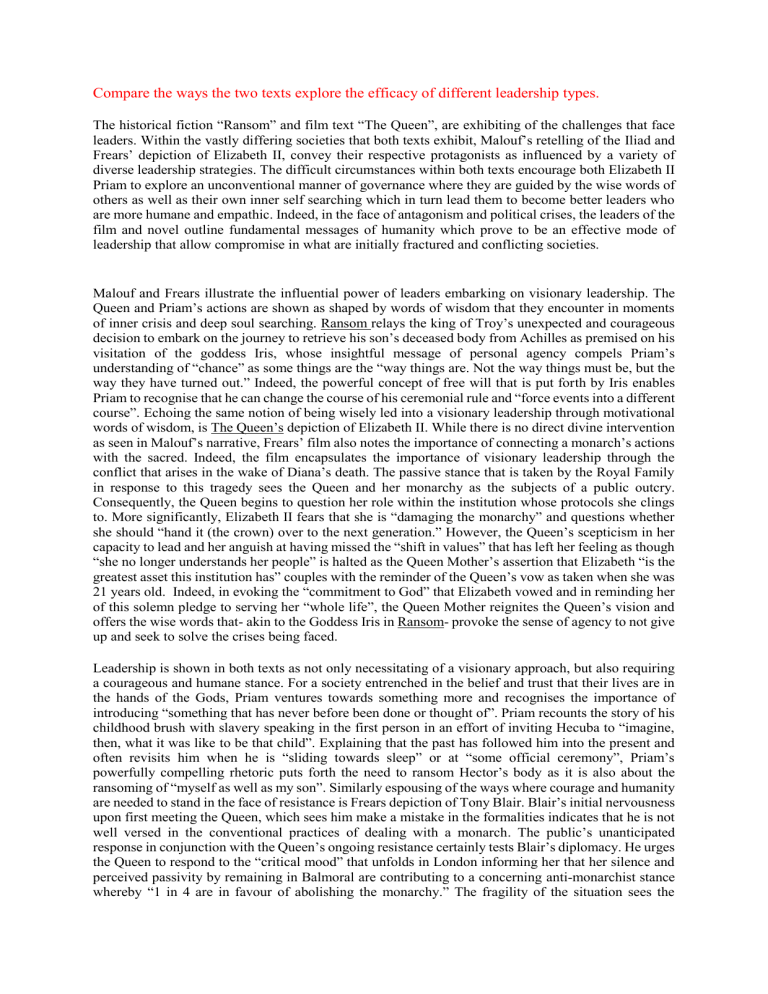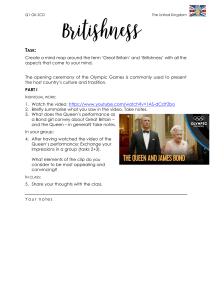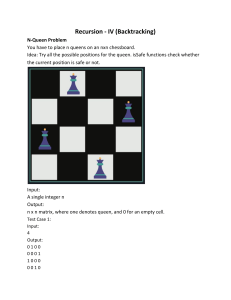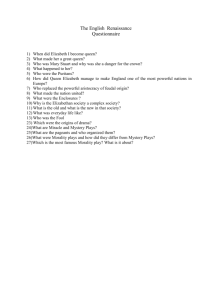Compare the ways the two texts explore the efficacy of different leadership types
advertisement

Compare the ways the two texts explore the efficacy of different leadership types. The historical fiction “Ransom” and film text “The Queen”, are exhibiting of the challenges that face leaders. Within the vastly differing societies that both texts exhibit, Malouf’s retelling of the Iliad and Frears’ depiction of Elizabeth II, convey their respective protagonists as influenced by a variety of diverse leadership strategies. The difficult circumstances within both texts encourage both Elizabeth II Priam to explore an unconventional manner of governance where they are guided by the wise words of others as well as their own inner self searching which in turn lead them to become better leaders who are more humane and empathic. Indeed, in the face of antagonism and political crises, the leaders of the film and novel outline fundamental messages of humanity which prove to be an effective mode of leadership that allow compromise in what are initially fractured and conflicting societies. Malouf and Frears illustrate the influential power of leaders embarking on visionary leadership. The Queen and Priam’s actions are shown as shaped by words of wisdom that they encounter in moments of inner crisis and deep soul searching. Ransom relays the king of Troy’s unexpected and courageous decision to embark on the journey to retrieve his son’s deceased body from Achilles as premised on his visitation of the goddess Iris, whose insightful message of personal agency compels Priam’s understanding of “chance” as some things are the “way things are. Not the way things must be, but the way they have turned out.” Indeed, the powerful concept of free will that is put forth by Iris enables Priam to recognise that he can change the course of his ceremonial rule and “force events into a different course”. Echoing the same notion of being wisely led into a visionary leadership through motivational words of wisdom, is The Queen’s depiction of Elizabeth II. While there is no direct divine intervention as seen in Malouf’s narrative, Frears’ film also notes the importance of connecting a monarch’s actions with the sacred. Indeed, the film encapsulates the importance of visionary leadership through the conflict that arises in the wake of Diana’s death. The passive stance that is taken by the Royal Family in response to this tragedy sees the Queen and her monarchy as the subjects of a public outcry. Consequently, the Queen begins to question her role within the institution whose protocols she clings to. More significantly, Elizabeth II fears that she is “damaging the monarchy” and questions whether she should “hand it (the crown) over to the next generation.” However, the Queen’s scepticism in her capacity to lead and her anguish at having missed the “shift in values” that has left her feeling as though “she no longer understands her people” is halted as the Queen Mother’s assertion that Elizabeth “is the greatest asset this institution has” couples with the reminder of the Queen’s vow as taken when she was 21 years old. Indeed, in evoking the “commitment to God” that Elizabeth vowed and in reminding her of this solemn pledge to serving her “whole life”, the Queen Mother reignites the Queen’s vision and offers the wise words that- akin to the Goddess Iris in Ransom- provoke the sense of agency to not give up and seek to solve the crises being faced. Leadership is shown in both texts as not only necessitating of a visionary approach, but also requiring a courageous and humane stance. For a society entrenched in the belief and trust that their lives are in the hands of the Gods, Priam ventures towards something more and recognises the importance of introducing “something that has never before been done or thought of”. Priam recounts the story of his childhood brush with slavery speaking in the first person in an effort of inviting Hecuba to “imagine, then, what it was like to be that child”. Explaining that the past has followed him into the present and often revisits him when he is “sliding towards sleep” or at “some official ceremony”, Priam’s powerfully compelling rhetoric puts forth the need to ransom Hector’s body as it is also about the ransoming of “myself as well as my son”. Similarly espousing of the ways where courage and humanity are needed to stand in the face of resistance is Frears depiction of Tony Blair. Blair’s initial nervousness upon first meeting the Queen, which sees him make a mistake in the formalities indicates that he is not well versed in the conventional practices of dealing with a monarch. The public’s unanticipated response in conjunction with the Queen’s ongoing resistance certainly tests Blair’s diplomacy. He urges the Queen to respond to the “critical mood” that unfolds in London informing her that her silence and perceived passivity by remaining in Balmoral are contributing to a concerning anti-monarchist stance whereby “1 in 4 are in favour of abolishing the monarchy.” The fragility of the situation sees the youthful and inexperienced Prime Minister gamble his coalition with the Queen seeing that it his “constitutional responsibility” to ensure that the monarchy and the public are a united force. As the film progresses, Blair’s humanity is repeatedly shown as he acts with valour as he admonishes Alistair Campbell for his hateful attitude towards the Queen arguing that it is rather unjust that after “fifty years of doing a job she never wanted” and “after giving her whole life to the service of her people” the public and the media are “baying for her blood.” Frears accentuates Blair’s humane persona through the manner where he is frequently filmed in his clustered and non-ornate home or his busy, untidy office. This emphasizes Blair’s humanity and explains his ability to “speak to the people”- an aspect that starkly juxtaposes with the Queen’s formal settings and her reserved and highly conventional interaction with others. Certainly, the film does exhibit Tony Blair as a “a compassionate young man (and) a breath of fresh air” showing that such qualities help him in his efforts to reconnect the Queen and her people. Thus, within Malouf’s novel and Frears’ film, the underlying message of humane and courageous leadership is affirmed. Inherent within both, Ransom’s fictional narrative and The Queen’s illustration of Britain’s monarch, is the essential exposition of compromising and humanitarian values as being more powerful at obtaining strong leadership than the language of stubborn defiance. Somax’s simple acknowledgement of the futility of revenge emboldens Priam’s desire for a peaceful resolution to the pain he is suffering for the death of Hector. Priam ultimately pleads with Achilles to return Hector’s body, “I have come to ask you, man to man, as a father, for the body of my son.” With Priam on his knees, reaching out to Achilles, in “fellow-feeling”, Malouf is therefore able to accentuate the strength of leaders who are willing to compromise to attain peaceful resolutions to stagnant disputes. In sharing Priam’s grief, Achilles ultimately recognises the futility of revenge and thus both establish a sense of shared humanity. Correspondingly demonstrating the effect of a concessional approach and the importance of shared human values, Elizabeth II is awakened into her humanity through the symbolic stag that she encounters. The connection between the stag and the Queen exists through the shared predicament of being hunted and targeted. Frears incorporates the metaphor of the stag as mirroring of the Queen and the royal family’s sense of feeling hunted by the alarming statements that are being fabricated by media outlets. The Queen’s empathy for the targeted animal is outlined through her earnest sentiments that the stag “didn’t suffer too much” and her melancholic demeanour when notified of its death, affirms Elizabeth as a woman with feelings rather than a monarch devoid of humanity. Certainly, in the aftermath of her visitation of the hunted stag, the Queen’s telling return to London and her efforts at merging with the public outside Buckingham Palace to examine the floral tributes, suggest that the initially stoic monarch is making some progress in grasping that “the world has changed, and one must modernise.” Analogously, both texts outline improved leadership as better attained from principles that are dispensed on the basis of empathy and shared humanity rather than that of tenacious resistance. The vastly differing societies represented in Malouf’s Ransom and Frears’ The Queen highlight the significance associated with the diversity of leadership abilities that are imperative in the face of unprecedented circumstances. Facing opposition, the leaders of the film and novel outline fundamental messages of courageous and adaptable leadership through their respective protagonists who are shown as learning to connect with their humanity. Indeed, their shared humanity induces their progression as ceremonial figures and proves the efficacy of different types of leadership in being a successful and sufficient guide.





